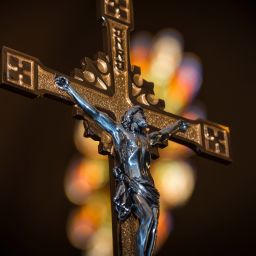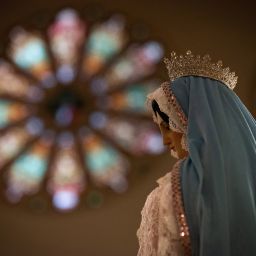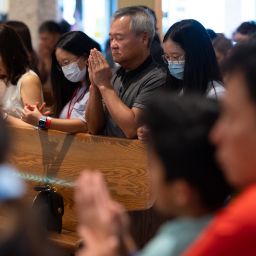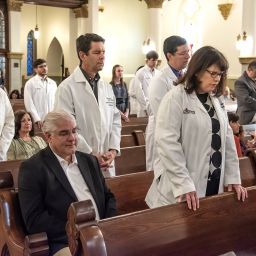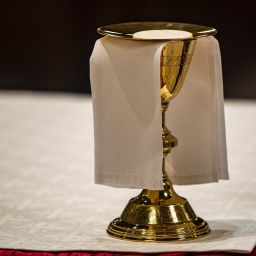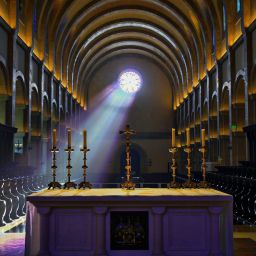By Father John Bayer, O. Cist.
Special to The Texas Catholic
This Christmas I had the very edifying experience of attending for the first time a celebration of Las Posadas. The celebration was organized by Puede Network, a youth empowerment organization in Oak Cliff that strives to help especially underserved minority students access transformative programs in academics, health and nutrition, community stewardship, recreational athletics and socio-emotional support.
I was invited to the celebration by my friends in the Gonzalez family, who run Puede Network. I had honestly never heard of Las Posadas beforehand. But the Gonzalez family had already shown me many wonderful things before, and so I was grateful when my schedule allowed me to check out what they had planned this time.
Of course, I’m still learning about this tradition, but my understanding of it leaves me with the impression that it is a precious piece of Latin American culture that the Church at large could enjoy – at least I certainly did!
It involves an endearing dramatization of the Holy Family seeking a place to rest for the birth of Jesus. Children dressed up as Mary and Joseph go around seeking hospitality, and as the community prays the rosary and sings traditional songs (like Para Pedir Posada), everyone is invited to contemplate the humility of God who, in the baby Jesus, became needy so that he could invite us into his friendship. There are costumes and candles, confetti and piñatas, songs and delicious food (like arroz con leche), but the heart of it all seems to me to be a catechesis about Christmas: an exhortation to recognize God in our midst by learning to see him in the humble and poor, and to respond with praise and thanksgiving as we come to understand that in welcoming Jesus into our lives we are in turn welcomed by God into his own. We are all humble and poor, and that is a great way to be, since God himself became humble and poor at the Incarnation, in order to invite us all: “Come to me, all you who labor and are burdened, and I will give you rest” (Mt 11:28).
To establish a relationship, we must learn to be vulnerable. That’s because we necessarily reveal our neediness whenever we ask someone to be our friend. Whenever we ask for hospitality, we run the risk of being rejected. True love requires risk. Thankfully, we are safe to run this risk, because God himself runs it when he asks us to receive him in Jesus. And even after our most terrible rejection of him – the crucifixion – God proves his power for love to be indomitable. For he can overcome even the grave; and with the poverty of his wounds on full display, he again and again invites us to peace and friendship (Jn 20:19-23). God is love. Love indeed conquers all. So, we can lower our defenses, admit our poverty, and invite others into friendship.
There is something else we can learn through Las Posadas, as we contemplate God asking to dwell among us: namely, that, even though God’s power can seem so small and vulnerable, like a baby, it is small like a seed, and so contains within itself the force of the largest and most abundant life. This hiddenness of God’s power is always a consolation, but perhaps especially today when sometimes the life of goodness can seem so fragile.
In a post-synodal exhortation to young people, Pope Francis exhorts us all, but especially the young, to strengthen our roots in the pious traditions of our elders, “the spiritual and human riches inherited from past generations” that nourish and defend us from divisive and manipulative ideologies (Christus vivit, §181). With Pope Francis, I would encourage all Hispanic Catholics, and especially the young, to be proud of this tradition of Las Posadas – to deepen their own understanding of it, invest in its celebration and invite more people to participate, especially those who have never experienced it. Read the Bible. Pray the rosary. Strive to understand and express the mystery of Christmas to those around you. The Incarnation is the anchor for everything true, beautiful and good, everything we long for. Consider it a proud moment if your home is ready to serve a celebration of Las Posadas. Especially when our secular culture threatens to transform Christmas into consumerism, we all ought to cherish – and in many cases renew – our authentically Christmas traditions, our Advent wreaths and Nativity scenes, our caroling and praying. We are blessed to belong to the Catholic Church, and to count as our brothers and sisters those who celebrate Las Posadas. May the custodians of this tradition cultivate it for the edification of us all!
Father John Bayer, O. Cist., is a monk at the Cistercian Abbey of Our Lady of Dallas in Irving.

